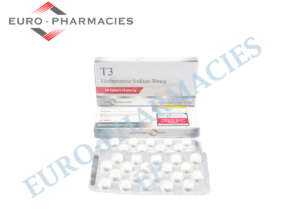Description
T3 (Liothyronine) — 50 mcg Tablets: Fast-Acting Thyroid Support Explained
What is T3 (liothyronine)?
T3 — medically known as liothyronine is the active thyroid hormone used in prescription form to replace or supplement the body’s natural triiodothyronine. Unlike levothyroxine (T4), which the body converts into T3, liothyronine is the active hormone and acts faster once it’s in the bloodstream. It’s available in measured strengths such as 50 mcg tablets for use when clinicians need rapid or controlled increases in thyroid activity
How T3 works and why doctors prescribe it
Active hormone, faster effect
Because liothyronine is the active thyroid hormone, its onset is quicker than T4 preparations. That quality makes it useful in specific clinical scenarios — for example, short-term suppression tests, certain cases of hypothyroidism that don’t respond to T4 alone, or carefully managed combination therapy alongside T4. Clinical guidance stresses that Liothyronine dosing is more complex because blood levels can fluctuate more than with levothyroxine.
When Liothyronineis considered
Physicians may add or switch to liothyronine when symptoms persist despite normal TSH on T4, or for rapid biochemical control in specialized situations. Professional societies note that while combination T4/T3 therapy is used by some patients and clinicians, the evidence for broad benefit is mixed and requires individualized decision-making.
Typical dosing & practical administration
Starting doses and titration
T3 dosing is individualized. Labeling and clinical resources recommend starting at a low dose and titrating carefully often with small incremental increases and close monitoring because excessive use can cause overt hyperthyroid symptoms and cardiac stress. For many adults, maintenance doses fall in a modest range, but your prescriber will tailor the plan to age, weight, cardiac history, and the treatment goal.
Practical tip
If you’re on mixed therapy, clinicians sometimes adjust the T4:T3 ratio to approximate physiological levels; others prefer stable T4-only regimens.see our T4 50 mcg tablets product page for more context. If you’re curious about T4 options while reading about T3. see our T4 50 mcg tablets product page for more context. (
Safety, side effects & monitoring
What to watch for
T3 can cause symptoms of overtreatment if the dose is too high: palpitations, anxiety, insomnia, weight loss, and in vulnerable people arrhythmias. Long-term excess also risks bone loss. For these reasons, frequent clinical follow-up and targeted lab testing are essential when starting or changing therapy. MedlinePlusDrugs.com
Who needs extra caution
People with cardiovascular disease, the elderly, and those with osteoporosis need more conservative dosing and closer monitoring. Never self-adjust or source thyroid hormones without medical oversight. If you’re exploring hormone protocols that include other agents, discuss interactions with your clinician — some practitioners also coordinate with other therapies such as HGH in very specific contexts. (internal link)
Real-world perspective: what patients should know
A practical way to think about is this: it’s a precision tool, not a shortcut. For some patients who remain symptomatic on T4 alone, adding low-dose T3 under supervision produces measurable improvement. For others, risks outweigh benefits. The key is a documented diagnosis, a clear treatment goal, and an agreed monitoring plan with your provider.
Bottom line safe, supervised, specific
Liothyronine 50 mcg tablets are a powerful, fast-acting thyroid option for carefully selected patients. Because dosing is sensitive and consequences of over- or under-treatment can be serious, it must be prescribed and followed by a qualified clinician. If you have symptoms of thyroid dysfunction or questions about combination therapy, talk to an endocrinologist and arrange the appropriate labs before making any changes.


Reviews
There are no reviews yet.